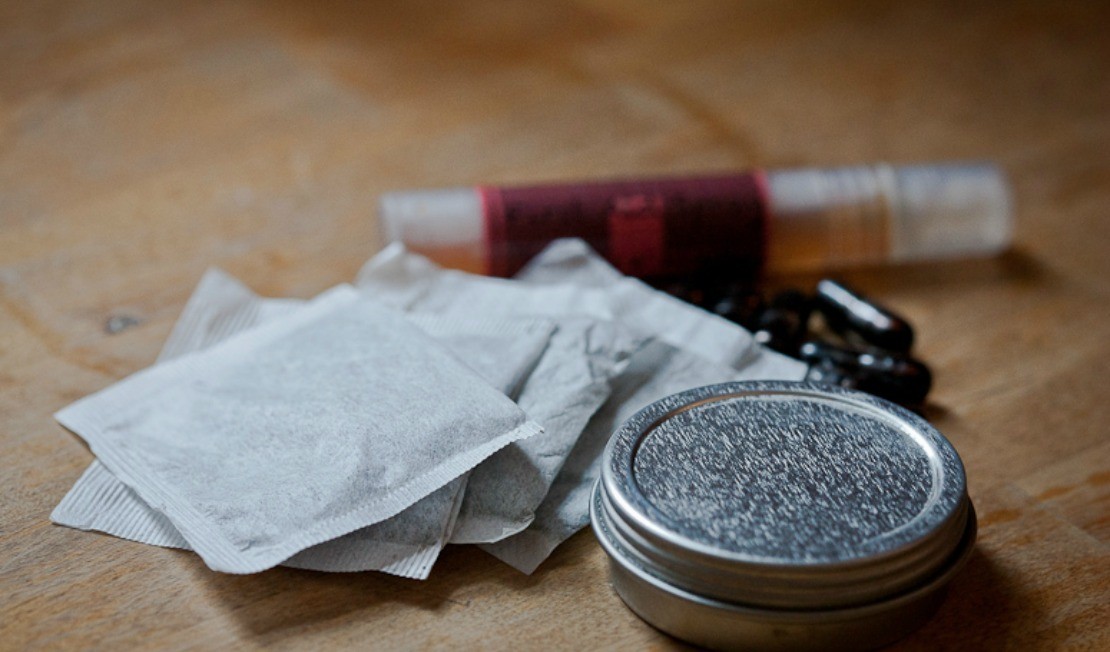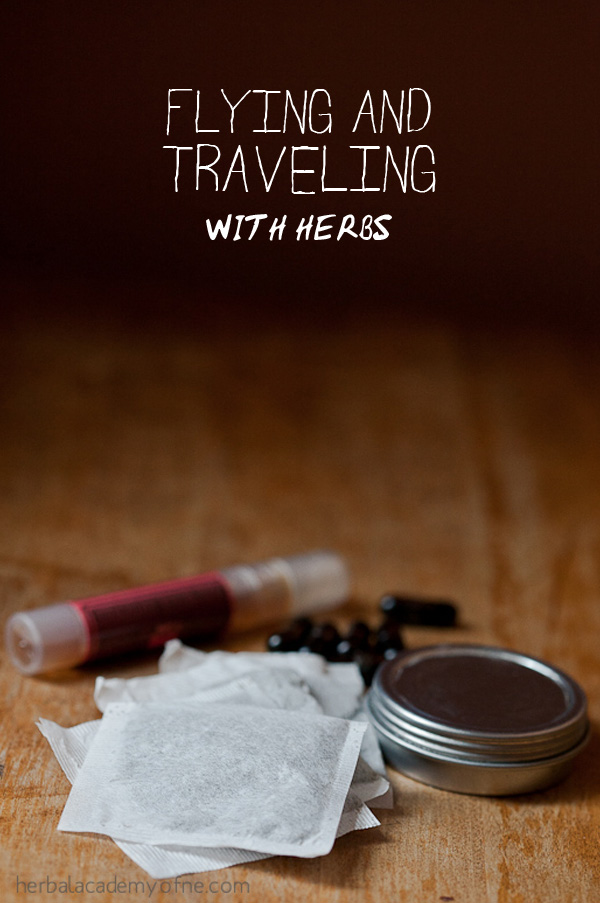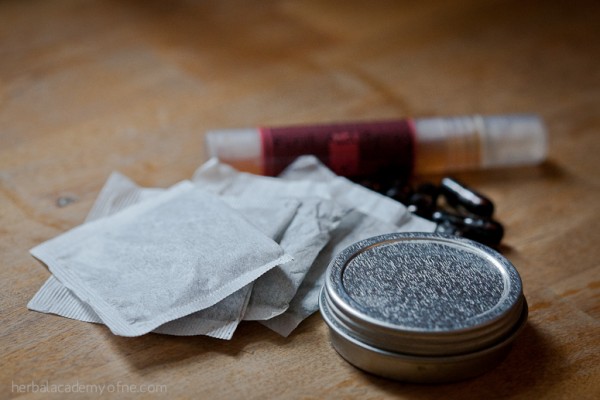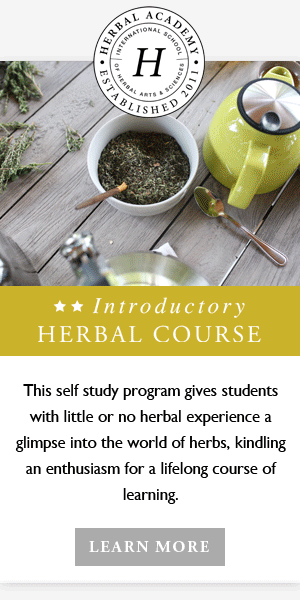
Flying and Traveling with Herbs
It’s easy to use herbs at home but what about traveling with herbs – especially plane travel when there are restrictions with space, weight, and size? How can you fly with enough herbs to address your needs and stay healthy while traveling without weighing you down? It’s easier than you think! I’ve been flying a lot this year so have developed a few tricks for easy ways to travel with the essential herbs I just can’t leave home without.
First, take some time to assess all your needs and then consider the herbs that can play multiple roles. For example, perhaps you have a sensitive stomach that protests when you divert from your dietary routine, as is common when traveling. You might also have trouble sleeping in an unfamiliar bed. Reach for chamomile, which will help both calm you down and soothe your digestion.

The next consideration is the form in which to bring your herbs. While I do prefer using loose herbs for teas, nothing beats a good quality commercial tea bag when traveling. As for tinctures, glass tincture bottles aren’t always that convenient, so you may want to think about liquid extracts in capsules. Think small and light!
Here are the herbs I travel with, and why.
Lemon Balm
When I fly, lemon balm (Melissa officinalis) is a soothing and relaxing nervine that calms my flight jitters, and, I hope, mitigates some of the radiation I’m exposed to during the flying process: both cosmic radiation, which is elevated in an airplane; and from the ionizing radiation from the backscatter X-ray machine during check-in. While some people say the backscatter radiation is negligible, other experts disagree. I’m not here to debate the controversies of the backscatter machine. And while I’m grateful that there is a metal detector option, sometimes I have neither the time nor the willingness to be patted-down by strangers.
Gentle and cheering lemon balm may not be on the forefront of people’s minds when thinking about protection from radiation, but in 2011 a study was published that suggests enormous potential for lemon balm’s ability to shield DNA from radiation-induced damage. In the study, 55 radiology workers drank 2 cups of lemon balm tea a day for a month, and measurements of their plasma were taken before the tea and after the tea. After just one month of drinking 2 cups of lemon balm tea daily, antioxidant enzyme levels increased and free radical damaged decreased. In the end, there was “a significant improvement in plasma levels of catalase, superoxide dismutase, and glutathione peroxidase and a marked reduction in plasma DNA damage, myeloperoxidase, and lipid peroxidation” leading the researcher to conclude that lemon balm tea “markedly improve oxidative stress condition and DNA damage in radiology staff when used as a dietary supplement for radiation protection” (Zeraatpishe et al, 2011).

You can start drinking lemon balm a day or two before you fly, as well as during the flight, and for a day or two after. Bring several tea bags with you – they are light and small and can be tucked into your bag. There are so many uses for this wonderful herb (read more ways to use lemon balm here). Because of the liquid restrictions, an easy way to bring lemon balm on a flight is to simply place one or tea bags into an empty water bottle, and then once you’re through security, just fill up at a water fountain. The lemon balm won’t infuse immediately in cold water, but within an hour, you’ll see the water start to change color and voila, you’ll have a nice bottle of soothing and antioxidant rich lemon balm tea to sip on during the flight. If you prefer hot tea, many airport cafes will let you fill up your reusable mug with hot water.
Passionflower
Because I’m sensitive to changes in my sleep patterns and environment, passionflower (Passiflora incarnata) always gets tucked into my travel bag. A uniquely beautiful vine native to the southeastern U.S., passionflower is a sedative that is lovely for reducing circular thoughts that prevent sleep. Passionflower is also a mild anti-spasmodic and a mild anti-depressant (especially for depression with anxiety). In addition, passionflower offers a mild analgesic action. One clinical study reports that healthy adults with primary insomnia who took a cup of passionflower tea before bed reported subjective sleep benefits (Ngan and Conduit 2011). I prefer bringing liquid caps (Gaia Herbs brand) with me instead of toting around a glass tincture bottle; liquid caps are light and unbreakable and are more concentrated. I just count out about how many I’ll need while I’m away and place them in a small light weight travel container.
Yarrow-Echinacea Spray
I’m also a bit accident prone, so I bring a small spray bottle of yarrow and Echinacea, to help heal and prevent infection in minor cuts and scrapes, and to prevent or treat a sore throat if I catch a cold (airplanes are notorious for spreading airborne germs). Yarrow (Achillea millefolium) is an anti-inflammatory, antimicrobial, mild analgesic, anti-catarrhal, and is a mild sedative. Echinacea (Echinacea angustifolia) is an anti-microbial and immunostimulant, topical anti-inflammatory, and can also have some effect on allergies. I use it quite successfully at the very onset of upper respiratory system infections.
Herbal Salve
Lastly, I include a small container of lavender herbal salve into my carry on, for more help with cuts and scrapes, chapped lips, and a bit of lavender scent to again help my sleeping issues. A little salve goes a long way, so just a small container will do!

So there you have it. These four herbal products take up hardly any space, but provide me with lots of benefits: less anxiety, DNA-protecting antioxidants, better sleep, protection from infections, pain relief, stimulated immune system, less inflammation, and more.
Start by making a list of what you need and the herbs with multiple actions (they all have multiple actions!) that can fulfill several of those needs. Then think about how they are best and most conveniently delivered, and how they might be able to work together to make your travels as smooth and healthy as possible!
REFERENCES
Ngan A, Conduit R. (2011). A double-blind, placebo-controlled investigation of the effects of Passiflora incarnata (passionflower) herbal tea on subjective sleep quality. Phytotherapy Research 25(8):1153-9.
Zeraatpishe A, Oryan S, Bagheri MH, Pilevarian AA, Malekirad AA, Baeeri M, Abdollahi M. (2011). Effects of Melissa officinalis L. on oxidative status and DNA damage in subjects exposed to long-term low-dose ionizing radiation. Toxicol Ind Health. Apr;27(3):205-12.







